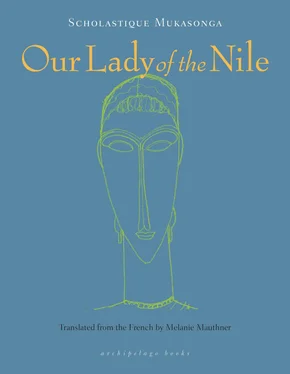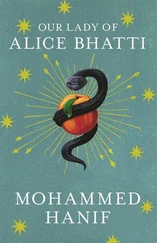“So the following Sunday, me and Immaculée went to the far side of the market. Kagabo had already tucked away his witch’s wares in an old bag woven from fig-tree bark. ‘Hey, you two, follow me, and hurry it up. Do you have my money, and more for Nyamirongi?’ We handed him our hundred-franc bills and off we went, along the track that led down to the village. We soon left it and proceeded along the ridgeline. Kagabo walked very fast; it was as if his huge bare feet hardly touched the grass. ‘Hurry up, hurry up,’ he repeated, over and over again. We struggled to keep up, out of breath. Then we reached a kind of plateau. From there we saw the lake, the distant volcanoes, and on the other shore, the mountains of the Congo. But we didn’t stop to admire the view. Kagabo pointed out a little hut to us, behind a rocky mound, like those of the Batwa people; a white smoke drifted out of it, spreading and mixing with the clouds. ‘Wait,’ said Kagabo. ‘I’ll see if she’ll let you in.’ We waited a long time. We could hear whispers, moans, and high-pitched laughter from inside the hut. Kagabo emerged: ‘Come,’ he said. ‘She’s finally put her pipe down. She’ll happily see you.’
“We ducked to enter the hut. It was very dark and filled with smoke. Eventually we spotted glowing red coals, and behind them, a shape wrapped in a blanket. A voice from under the covers spoke: ‘Come closer, come closer.’ Kagabo motioned for us to sit down; then the covers parted slightly and we saw an old woman’s face, wrinkled, crumpled like a shriveled passion fruit, but with eyes that burned as bright as embers. Nyamirongi, for it was she, asked our names. How she laughed when Immaculée told her she was called Mukagatare, ‘You may not yet be “She of Purity,” but that will come one day.’ She asked the names of our parents and grandparents, then pondered for a moment, holding her little head in hands that seemed so big. Then she recited the names of our ancestors, even those our parents couldn’t have known. ‘You’re not from very good families,’ she concluded, chuckling. ‘But nowadays they say it no longer matters.’
“She turned to Immaculée: ‘So, Kagabo tells me it’s you who wants to see me.’
“Immaculée explained to her that she had a sweetheart in the capital, but that she’d heard, or rather some friends had written to tell her, that they’d seen him with other girls on his motorbike. She wanted Nyamirongi to put a stop to that, to make her sweetheart quit going out with them, so he would be hers, and hers alone.
“ ‘Right,’ said Nyamirongi. ‘That can be arranged. But tell me, have you slept with your sweetheart?’
“ ‘No! Never!’
“ ‘He’s fondled your breasts, at least?’
“ ‘Well, a bit, yes,’ Immaculée replied, bowing her head.
“ ‘And elsewhere, too?’
“ ‘A bit, a bit,’ Immaculée murmured.
“ ‘Right, I see … That can be arranged.’
“Nyamirongi rummaged in the various calabashes and pots that were piled up all around her. She took out some seeds, which she examined for a long while, then selected a few and placed them in a little mortar. She crushed the seeds to a powder, and spat on them, all the while mumbling some inaudible words, and made a thick concoction that she wrapped in a piece of banana leaf, like cassava paste.
“ ‘Here, take this. You’re going to write to your sweetheart — you’re a lycée girl, you can write, even women know how to write these days! The paste will be dry in three days, you’ll grind it to a powder and slip some into an envelope, but don’t forget, before you do that, rub some over your breasts, and the rest. When your suitor opens the letter, he’ll breathe in the powder, and I promise, you’ll keep your sweetheart all to yourself, he’ll stop going off with other girls. Now give me five hundred francs, and he’ll have eyes for you alone, he’ll think only of you, you’ll hold him captive; I give you the word of Nyamirongi, daughter of Kitatire, but you must let him caress you all over, and I mean all over, understand?’
“She picked up her pipe and drew three puffs on it. Immaculée handed her a five-hundred-franc note, which she tucked beneath her blanket. Then she turned to face me:
“ ‘And why did you come? What do you want from me?’
“ ‘They said you control the rain. I want to see how you do it.’
“ ‘You’re too curious. I don’t control the rain: I talk to her, and she answers. I always know where she is, and if I ask her to come or go, and if she feels like it, she does what I ask. You young girls at the abapadri school, you no longer know anything. Back when I was young, before the Belgians and the chief of the abapadri ousted King Yuhi Musinga, they respected me, even then. They knew of my power because it came from my mother, who received it from her own mother, who had received it from her mother, who herself received it from our ancestor Nyiramvura, “She of the Rain.” I lived in a large enclosure at the foot of the mountain, a large enclosure near a watering hole. When the rains were late, and you know what the rain is like, she never knows when she’s due, the chiefs led their cattle to my watering hole, which never ran dry. They brought their young dancers, the intore . And they’d say: “Nyamirongi, tell us where the rain is, tell her to come and we’ll give you cows, jugs of mead, and cloth so you can dress as if you were at court with the King.” And I replied: “First, you must dance for the rain, after your cattle have slaked their thirst; your intore must dance for the rain.” And the intore danced before me, and when they had danced enough, I told the chiefs: “Return to your enclosures, for the rain is coming, she’ll catch up with you before you get there.” And the rain fell on the cattle, on the beans, on the corn, on the taro; it fell on the sons of Gihanga: on the Tutsi, on the Hutu, on the Batwa. I saved the country often, which is why they called me Umubyeyi, Mother, mother of the country. But when the Bazungu gave the Drum to the new King, they chased me from my enclosure, they wanted to hang me, and I hid in the forest for a long time. Now that I am old, I live alone in this Batwa hut. People go to the abapadri to make them bring the rain. But do these whites know how to talk to the rain? The rain hasn’t been to school; she won’t listen to them: the rain does as she pleases. You need to know how to talk to her. So some people still seek me out, like your friend here. And not just about the rain. If you want to know how I talk to the rain and how the rain, if she is so inclined, obeys me, then dance for the rain, dance here before me for the rain. It’s been so long since anyone danced before me for the rain.’
“ ‘Nyamirongi! You can see very well I can’t dance in this lycée uniform, and your hut is much too small, but please, tell me anyway where the rain is now.’
“ ‘Well, if you don’t wish to dance, give me five hundred francs and I’ll tell you where the rain is.’
“I gave her the five hundred francs.
“ ‘Right, you’re a good girl. I’ll show you what I’m capable of.’
She stretched out her right arm and made a fist, but with her forefinger pointing toward the hut’s rounded roof. A long nail stuck out like an eagle’s talon. She moved her arm so that the forefinger with its long nail covered the four points of the compass. Then she drew her arm back beneath the blanket.
“I know where the rain is. She is over the lake, and she tells me she’s coming. Leave now, quickly, run fast before she catches you. I see her, she’s coming, she’s crossing the lake. Give me another five hundred francs if you don’t want to be struck by lightning. You made the rain angry because you didn’t dance for her. Give me five hundred francs and the lightning will spare you.’
Читать дальше












